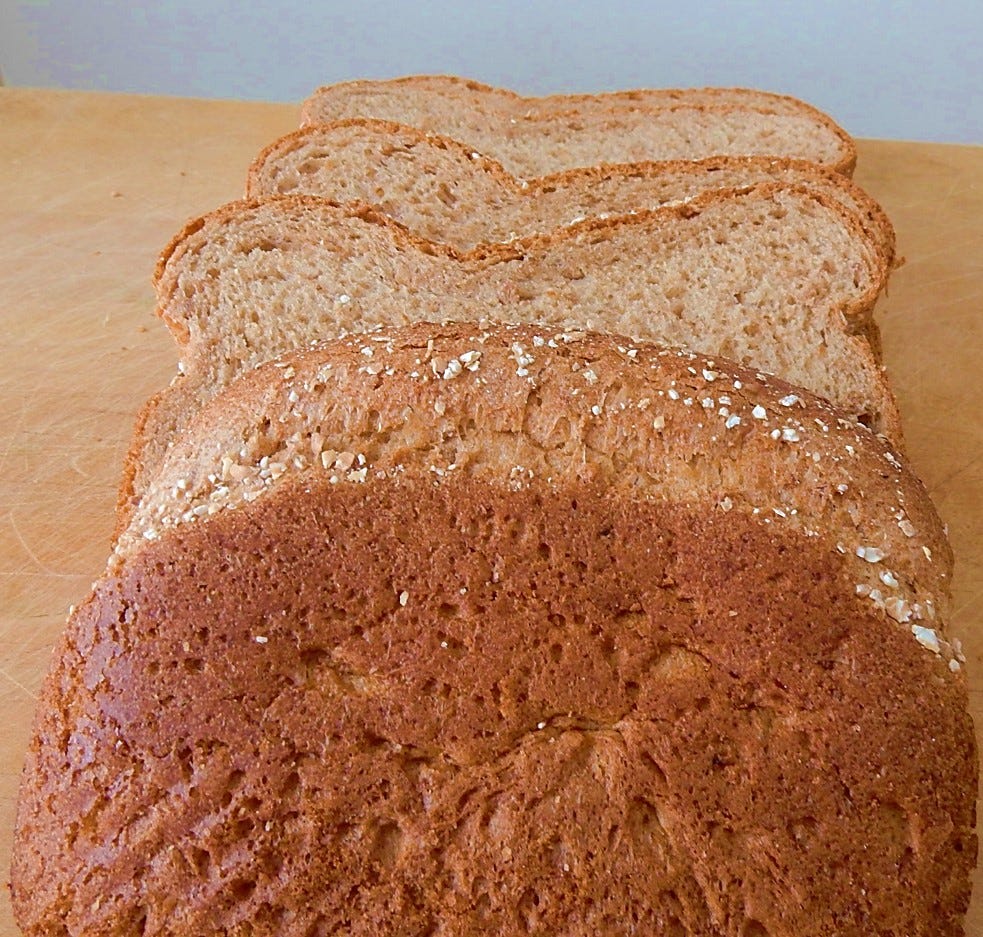Hello, I’m Alice, and I write about getting outside, harvesting my own food, living a self-reliant lifestyle, and stretching beyond the limits of that pesky comfort zone. If you like any of those things, you can subscribe for free to have occasional posts delivered straight to your inbox.
My grandmother was incredibly superstitious. She had a long list of often bizarre old wives' tales, one for every occasion. You couldn't scratch your nose around Grandma Alice without her telling you someone must be talking about you.
And you certainly couldn't shiver without being told someone had just strolled across your grave.
And if your left hand itched, it meant that money was coming your way — but only if you spit on your palm and then rubbed it on your butt.
Grandmothers use skills of observation, intuition, and tradition
like superpowers!
It might be easy to shrug off some of the more outlandish beliefs our grandmothers attempted to pass down, but maybe we shouldn't be too hasty in our disregard. We don't want to toss that baby right out with the bath water.
Remember that the wisdom of old wives (My grandmother lived past her 91st birthday.) developed over centuries of human experience. Before we relied on technology, double-blind scientific studies, and peer-reviewed journals to decide what was right and proper, people used their observation, intuition, and tradition (skills more modern generations have neglected to appreciate and develop).
While science has proven that some traditional old wives' tales are just plain unfounded superstitions, we are increasingly discovering that our grandmothers weren't crazy and deluded. Modern science proves that some of those "superstitions" have some surprising merit.
Here are some examples of proven truth in what was once considered old wives' tales. I don't know about you, but I'll keep spitting on my left hand and rubbing my butt. You know? Just in case.
1. Cold causes sickness.
"Don't go outside with your hair wet! You'll catch your death of cold!" I remember scoffing at that statement under my breath. Nowadays, everybody knows that the common cold is just a bunch of viruses partying it up in your body. So it doesn't matter if I run around in 20-degree weather with a damp head and wet feet, right?
Wrong. Researchers at Cardiff University tested the correlation between body temperature and viral fiestas. By making a bunch of people stand in foot baths —some icy cold, others spa-like warm — they discovered that the cold wet feet group were 29 percent more likely to host a microbe dance party in their nasal cavity.
Lowering your body temperature apparently sends your immune system on a little mini-vacay.
In your face, science! Grandma was right all along. We really shouldn't go out with wet hair, and we should probably try to stay dry and warm, too.
2. Eating + Swimming = Drowning.
It always seemed like cruel and unusual punishment that we would take a picnic lunch to the beach, scarf it down way too fast, and then be forbidden to swim.
"You have to let your lunch settle. If you go in the water now, you'll cramp up and then die a terrible watery death." So we had to sit there in the sand —for an entire hour — just looking at the water. B-O-R-I-N-G!
But perhaps Grandma didn't simply delight in torturing little children. There is actually some science to back up her somewhat dramatic claims. When we eat, blood flow to the stomach muscles increases to aid digestion.
This means less blood flow (and therefore less oxygen) is available for the arms and legs, which require an increased amount during vigorous exercise (or play in the case of tormented children). Depriving muscles of needed oxygen can lead to cramps, which kinda sorta increases the chance of drowning, even if just a little bit.
Hey, Grandma was nothing if not cautious.
3. Gain a child, lose a tooth.
"I lost a tooth for every child," she told me.
Children don't only take their toll on our sanity but also our pearly whites. A New York University study showed that women who had given birth to at least one child were more likely to develop gingivitis, which increases the risk of developing other gnarly diseases.
Researchers can't find the reason for the link (although it's probably those chocolate bars we were trying to scarf down behind the laundry room door when our children weren't looking), but Grandma was right.
4. Chicken noodle soup as medicine.
I remember my mother almost force-feeding me chicken noodle soup when I was a sick child. Even though her version was probably canned and full of MSG, her heart was in the right place. She learned from her mother and grandmother that chicken soup is just what you feed sick kids.
While that warm, brothy liquid won't cure a common cold, science has discovered that chicken soup reduces inflammation, soothing sore throats and stuffy noses.
The coolest thing about the research is that the researchers still don't know WHY chicken soup works; they just know that it does, which is what grandmothers have known since ancient times. So put down that snotty tissue and eat up. It's not only good for the body, it's also good for the soul.
5. The crust of the bread is good for you.
"Eat it! It will put hair on your chest!"
As a girl, this might not have been the most compelling argument to coerce me into eating the reviled bread crust.
Interestingly enough, a study published in the Journal of Agricultural and Food Chemistry suggests that the crust might be the healthiest part of the bread, containing up to eight times the antioxidants as the yummier, squishy inside. However, there are no guarantees on hair growth.
6. Heartburn during pregnancy means a hairy baby.
Grandmas tend to be good predictors of pregnancy outcomes. Mine was rather preoccupied with studying the shape of my tummy, my eating habits, and heartburn, which is apparently a trusted indication of how much hair that young'un will have on its noggin.
Sounds ridiculous, right? Not so much. A study by Johns Hopkins University confirmed that women who experience the most heartburn during pregnancy give birth to babies with average or above-average amounts of newborn hair.
Exactly how it works is still a mystery, although it might be related to bread crust consumption.
7. Carrots are good for your eyesight.
"Have you ever seen a rabbit wearing glasses?"
Grandma had a good point, although I suspect it might have more to do with a lack of optometric care than dietary practices. I could be wrong. I haven’t been a grandmother for very long.
Carrots contain high amounts of beta-carotene, an essential precursor to vitamin A. A severe lack of vitamin A can cause blindness (and how many blind bunnies have you seen hopping around?). Vitamin A also prevents macular degeneration and the formation of cataracts.
However, if your vision problems aren't related to a lack of dietary vitamin A, even a truckload of carrots will not help you see better. It's still not a bad idea to take a tip from Grandma (and Bugs Bunny) and enjoy a good carrot.
8. Honey is good for a cough.
Forget those fancy drugs with their hard-to-pronounce names. Grandmas have been shoving spoonfuls of honey down the throats of ailing children since ancient Egyptian times. A 2007 study showed that honey was even more effective (and a hell of a lot easier to say) than the drug dextromethorphan for soothing nighttime coughs.
Researchers believe it is the natural antioxidants in the honey, along with its viscosity, that make it so effective. I'm guessing it tastes a whole lot better, too.
9. Sugar cures the hiccups.
Ah, hiccups — the mother of so many folk remedies and wives' tales. Sometimes, I would just pretend to have the hiccups so I could get a teaspoonful of sugar (and then spend the next two hours bouncing off walls and furniture and generally driving adults insane).
This one actually has scientific backup dating back to the early seventies, so maybe Grandma was just spending her evenings immersed in the most current medical literature.
It seems to work by overstimulating the nerve that connects the brain to the abdomen (along with every other nerve in the child's body), distracting it from its preoccupation with convulsing the diaphragm. This is how scaring the crap out of a hiccup sufferer works, too. However, the sugar method has far less of a danger of soiled underwear or emotional scarring.







